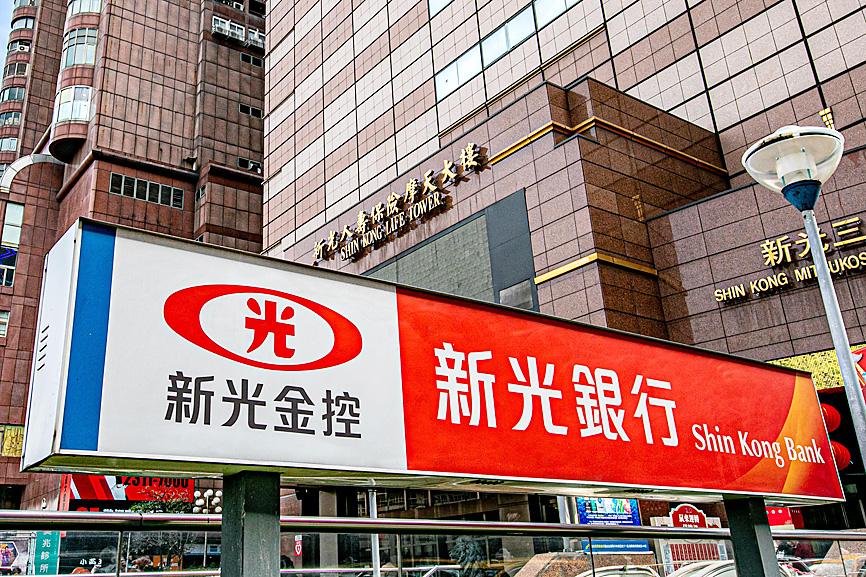The Financial Supervisory Commission (FSC) on Thursday penalized Shin Kong Financial Holding Co (新光金控) for poor corporate governance and lax internal controls, including a three-month suspension for company chairman Victor Hsu (許澎).
The commission also fined subsidiary Shin Kong Life Insurance Co (新光人壽) NT$3 million (US$105,623), cut Shin Kong Life Insurance chairman Pan Po-cheng’s (潘柏錚) salary by 30 percent for three months and banned the insurer from making transactions with six affiliated companies for three years.
Senior executives of Shin Kong Financial Holding and its subsidiaries, which also include Shin Kong Commercial Bank (新光銀行) and Master Link Securities Corp (元富證券), attended four meetings presided over by Eugene Wu (吳東進) — who retired from Shin Kong Financial Holding in June 2020 and was suspended as chairman of the life insurance arm by the commission in September 2020 — from October to November last year regarding the group’s business operations and allocation of resources, the commission said in a statement.

Photo: Wu Chi-lun, Taipei Times
The meetings and Wu’s involvement indicated that senior executives were still takng orders from him, even after the commission in 2020 barred him from being involved in the group’s business, citing his poor supervision, the statement said.
As the head of Shin Kong Financial Holding, Hsu has the responsibility to supervise its operations and management, and to oversee management of subsidiaries, the commission said.
He failed to fulfill his duty in contravention of Artical 54 of the Financial Holding Company Act (金融控股公司法), it said.
The commission ordered Shin Kong Financial Holding to review and amend its internal regulations on major shareholders, develop specific measures to improve the group’s corporate governance and submit a report to the board of directors, the statement said.

Taiwanese suppliers to Taiwan Semiconductor Manufacturing Co. (TSMC, 台積電) are expected to follow the contract chipmaker’s step to invest in the US, but their relocation may be seven to eight years away, Minister of Economic Affairs J.W. Kuo (郭智輝) said yesterday. When asked by opposition Chinese Nationalist Party (KMT) Legislator Niu Hsu-ting (牛煦庭) in the legislature about growing concerns that TSMC’s huge investments in the US will prompt its suppliers to follow suit, Kuo said based on the chipmaker’s current limited production volume, it is unlikely to lead its supply chain to go there for now. “Unless TSMC completes its planned six

Power supply and electronic components maker Delta Electronics Inc (台達電) yesterday said second-quarter revenue is expected to surpass the first quarter, which rose 30 percent year-on-year to NT$118.92 billion (US$3.71 billion). Revenue this quarter is likely to grow, as US clients have front-loaded orders ahead of US President Donald Trump’s planned tariffs on Taiwanese goods, Delta chairman Ping Cheng (鄭平) said at an earnings conference in Taipei, referring to the 90-day pause in tariff implementation Trump announced on April 9. While situations in the third and fourth quarters remain unclear, “We will not halt our long-term deployments and do not plan to

‘SHORT TERM’: The local currency would likely remain strong in the near term, driven by anticipated US trade pressure, capital inflows and expectations of a US Fed rate cut The US dollar is expected to fall below NT$30 in the near term, as traders anticipate increased pressure from Washington for Taiwan to allow the New Taiwan dollar to appreciate, Cathay United Bank (國泰世華銀行) chief economist Lin Chi-chao (林啟超) said. Following a sharp drop in the greenback against the NT dollar on Friday, Lin told the Central News Agency that the local currency is likely to remain strong in the short term, driven in part by market psychology surrounding anticipated US policy pressure. On Friday, the US dollar fell NT$0.953, or 3.07 percent, closing at NT$31.064 — its lowest level since Jan.

The New Taiwan dollar and Taiwanese stocks surged on signs that trade tensions between the world’s top two economies might start easing and as US tech earnings boosted the outlook of the nation’s semiconductor exports. The NT dollar strengthened as much as 3.8 percent versus the US dollar to 30.815, the biggest intraday gain since January 2011, closing at NT$31.064. The benchmark TAIEX jumped 2.73 percent to outperform the region’s equity gauges. Outlook for global trade improved after China said it is assessing possible trade talks with the US, providing a boost for the nation’s currency and shares. As the NT dollar